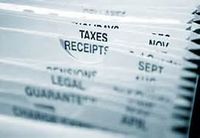Federal and state tax officials provide a long list of records that you should keep to support claims made on tax returns. Records help you identify income sources , keep track of expenses, keep track of the basis of property, and prepare individual and business tax returns.
Here is a list of the basic records you should save along with your tax return:
 1. Income Statements
1. Income Statements
*Form(s) W-2
*Form(s) 1099
*Bank statements
*Brokerage statements
*Schedule(s) K-1
2. Expenses
*Sales slips
*Invoices
*Receipts
*Canceled checks or other proof of payment
*Written communication from qualified charities
*Individual credit card charge slips (the statement may not be acceptable)
3. Home Ownership and Improvements
*Closing statement
*Purchase and sales invoices
*Proof of payment
*Insurance records
*Receipts for improvement costs
4. Investments
*Brokerage statement
*Mutual fund statements
*Form(s) 1099
*Form(s) 2439
If your tax returns contain more specific claims such as deductions for the business use of a home, child care credit, and the like, the IRS has more specific records requirements.
To find out more about how long you should save these records, check out our blog: Guidelines for Saving Tax Records, Returns and Receipts.
 is now
is now 
